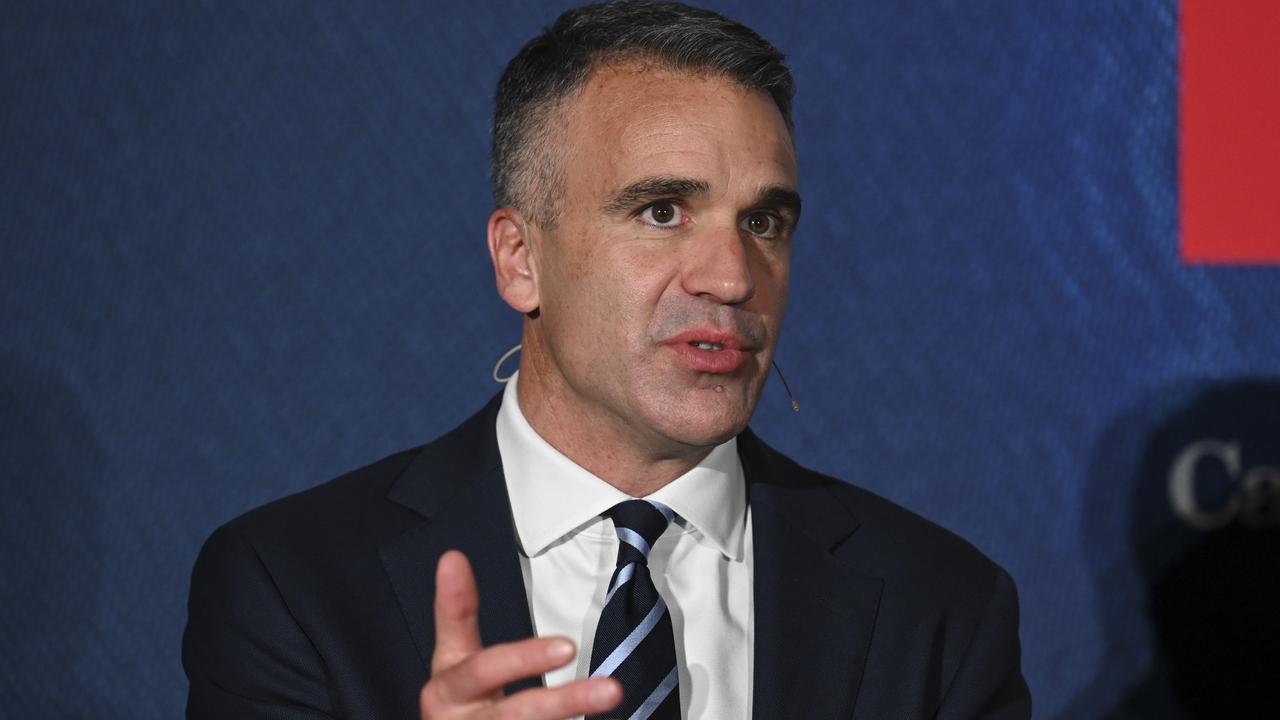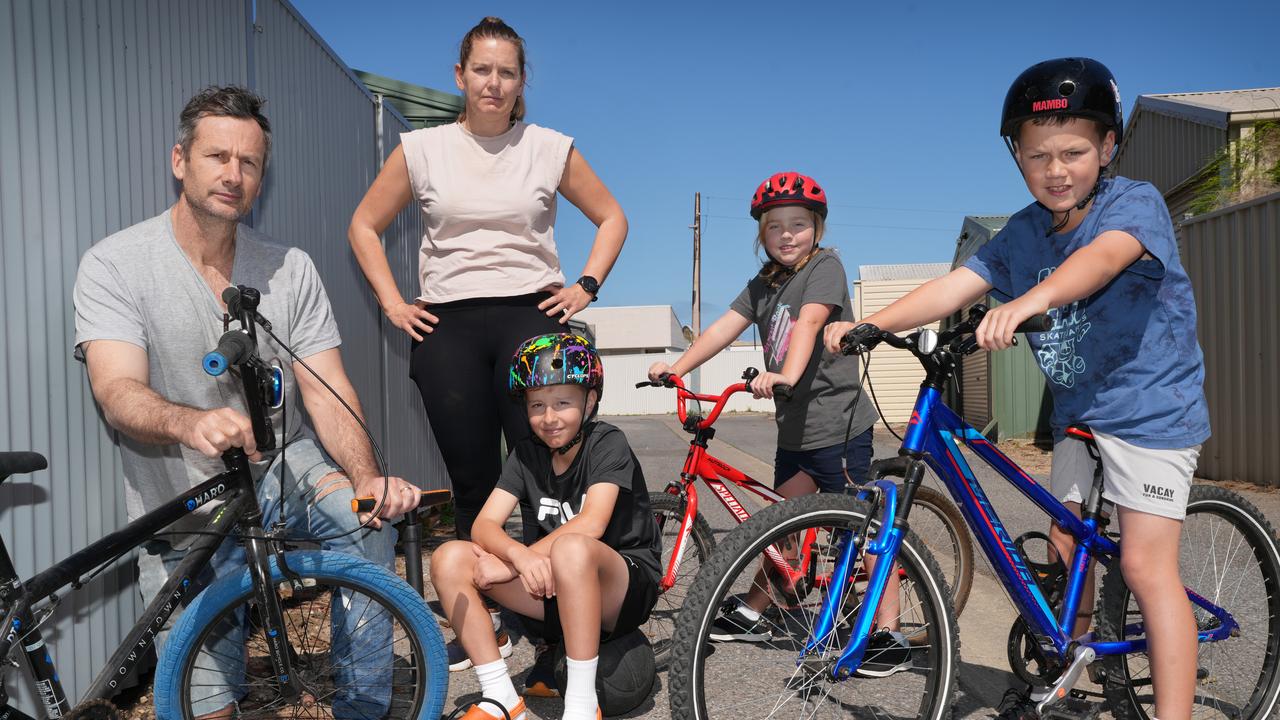SA Premier Peter Malinauskas details plan to restrict social media access for under-14s
Social media giants could face fines or court action under new laws aimed at protecting young children from harm online.
SA News
Don't miss out on the headlines from SA News. Followed categories will be added to My News.
Social media companies would face fines in the millions for allowing children under 14 to create accounts, and parents could sue if their child was harmed by using platforms like Facebook or TikTok, under nation-leading laws proposed by the state government.
Premier Peter Malinauskas on Sunday released draft legislation which would ban children under 14 from signing up and require tech companies to gain parental consent before allowing 14 or 15 year olds to use their platforms.
If approved, it would make South Australia the first state to implement such a ban.
However, Mr Malinauskas said the model could be adopted by any jurisdiction and he used last week’s national cabinet meeting to lobby Prime Minister Anthony Albanese and other state and territory leaders to join the push.
“The evidence is clear, social media is causing our children harm,” said Mr Malinauskas, who is a father of four.
“And my intent is clear, we are going to do something about it. When we see products doing children harm, whether it be drugs, cigarettes or alcohol, governments have a role to play. The addictive nature of social media is no different.”

The proposal, which will undergo public consultation, was designed by former High Court Chief Justice Robert French who was tasked by Mr Malinauskas in May with examining the legal and technological issues related to banning young children from using social media.
Mr French’s 276-page report includes the draft Children (Social Media Safety) Bill, which the government will use as a starting point for public consultation.
Mr French has proposed a system that would impose a duty on social media platform operators to prevent access by children of a restricted age.
He has suggested a regulator oversee the new system, monitor compliance, take complaints and issue fines for breaches.
In serious cases the regulator could seek significant penalties and orders through the Supreme Court.
Mr Malinauskas said he expected social media companies to resist the changes but said they had been consulted.
“We would much rather have social media companies work with us rather than against us, because ultimately if they play a role that is constructive, that is better for everyone,” he said.
“It is rational for them to resist. Life’s good for these companies at the moment. They’re making squillions an they’re doing it largely unimpeded by government, so of course they’re going to resist.
“Our job is to make sure that where children are being harmed, their resistance is useless, because we have very profound duties to our kids.”
The proposed laws would also enable parents of children who suffer mental or physical harm as a result of accessing social media to sue for damages if the platform operator breached its obligations.
Platforms which pose little risk to children or offer a positive influence, such as those run by education or health authorities, could seek an exemption from the ban.
An exemption could also apply to closed online groups or social media controlled by an adult, such as a classroom teacher.
Opposition Leader Vincent Tarzia said he was yet to see “the detail, but we would be supportive of any measures that protect the mental health of our young people.”
The proposed laws have been welcomed by parents, including those who have lost children to suicide after they were targeted online.
Currently, platforms including Facebook, TikTok, X, Snapchat, YouTube and Instagram require users to be at least 13 to start an account, but the limit is not well-policed and many younger children sign up.

Western Adelaide neighbours Lauren Dawson and Erik Arnoldus both have primary school aged children and support a ban on young ones using social media.
“Our plan is to delay mobile phones and social media as long as we can,” said Ms Dawson, 42.
She limits screen time for her son Eddy, 10, and daughter Molly, 8, and has “lots of conversations about communicating with strangers” and online scams.
Mr Arnoldus, 51, said he kept his children, including son Ari, 10, off social media because it could be a distraction and expose them to bullying.
He said a change to the law “cannot come soon enough” and would help parents to enforce limits with their children.
Internationally, Spain has put in place a minimum age for social media media use of 14 and a recent law change in the US state of Florida will impose the same age restriction from January 2025.
An Australian federal parliamentary committee is running an inquiry into social media and related harms, scams and misinformation.
Last year the Australian eSafety Commission fielded more than 1850 reports of children under 16 experiencing serious cyber-bullying.
The most common form of abuse was “nasty comments” or “serious name calling”, followed by “offensive/upsetting pictures and/or videos”.
Kids are also reporting “fake accounts and impersonations”, “threats of violence,” and “unwanted contact”.
A 2021 report by the commission found 42 per cent of 12-13 year olds used Facebook, 39 per cent used Instagram, 26 per cent were on Snapchat and 66 per cent on YouTube.
It is believed those numbers would have grown since 2021, in part driven by habits learned during Covid lockdowns.
“It will save lives”
Parents whose teens took their lives after being targeted online have urged other government’s to follow South Australia’s lead in moving to restrict children’s access to social media.
Melbourne dad Wayne Holdsworth and Sydney mum Emma Mason have backed South Australian Premier Peter Malinauskas’ proposal to ban under-14s from holding accounts with platforms such as Facebook, Instagram, TikTok and X.
They say the change should be made nationally, and swiftly.
Mr Holdsworth’s 17-year-old son Mac died by suicide in October last year after being targeted by a sextortion scheme.
He said an age restriction on social media use was “long overdue” and “will save lives”.
“The owners of these (social media) platforms are making billions of dollars and yet aren’t playing by Australian values,” he said.
“They’re compromising our children and offering them a service that has long-lasting negative effects.”
Ms Mason’s 15-year-old daughter Tilly Rosewarne died by suicide in February 2022, after she was subjected to in-person and online bullying, including the circulation of a fake nude photo.
In her daughter’s case, Ms Mason said social media was used to create “instant harm”.
She described the SA draft laws, and a comprehensive report on the issue by former High Court Chief Justice Robert French, as “a welcome step forward” which every state and territory should follow.
However Ms Mason had hoped for a ban on social media access until age 16, rather than allowing earlier access with parental permission.
“My concern about allowing it to be OK at 14 or 15 is that the pressure is still there on parents to comply with the wishes of children who say ‘everyone else has got it’,” she said.
“The power of being able to say to a child you can’t do it because it’s illegal empowers parents to manage the pressure that comes with that.”
Ms Mason said social media was “a tool of connection but it can be a tool of such harm that it needs to be heavily monitored”.
“We know that adults behave poorly on social media. We need to control what we’re giving our children who aren’t thinking about the repercussions (of misuse),” she said.
Just last week Mr Holdsworth was told of a 13-year-old boy who paid $3000 to an online extortionist.
He has also heard of children as young as five and seven accessing internet pornography or body-shaming content.
“Parents are telling me their eight, nine, 10 and 11 year olds are on social media, on their ipads and phones, for four to six hours a day,” Mr Holdsworth said.
Financial penalties for companies that breached their obligations under the proposed laws would be essentially to enforce the change, he added.
“At the moment they’re just freewheeling, there’s no accountability. Why hasn’t something been done before now?”
More Coverage
Originally published as SA Premier Peter Malinauskas details plan to restrict social media access for under-14s










